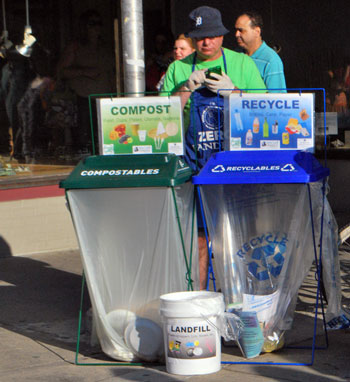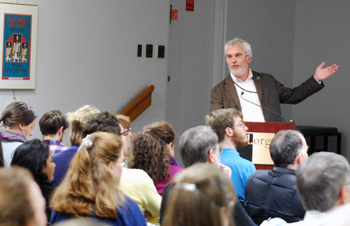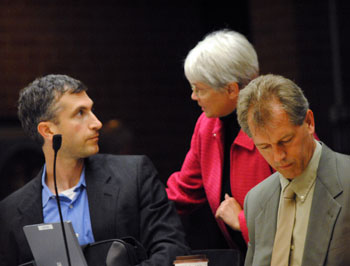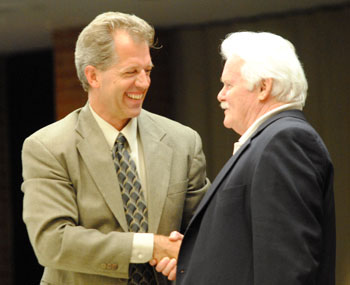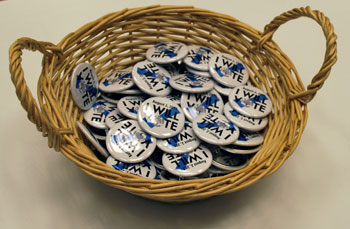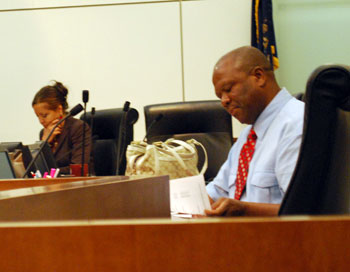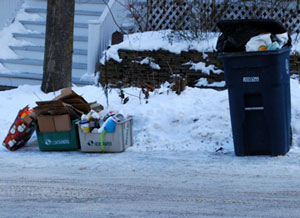At its Aug. 4, 2011 meeting, the Ann Arbor city council voted unanimously to increase by $107,000 the city’s contract with Recycle Ann Arbor (RAA) for curbside collection of the city’s single-stream recycling carts.
Later in the same meeting, the council considered but ultimately postponed a decision – until its second meeting in September – to fund the increased RAA contract by terminating its contract with RecycleBank for administering a coupon-based incentive program. That would have ended a 10-year deal approved last year by the council. The termination of the contract would include a budget appropriation to fund the RAA contract change, and would require 8 votes. Based on deliberations on Aug. 4, it’s uncertain if those 8 votes will be achieved.
The Recycle Ann Arbor contract change reflected the council’s choice to revisit a decision it had made at its July 5 meeting to reject that contract change. The decision to reconsider the July 5 vote came at the council’s July 18 meeting, which the council then postponed until Aug. 4.
The change reflects a bump from $3.25 to $3.55 per month per cart, for a total of $107,042 annually. The city council had voted on March 15, 2010 to adopt the single-stream recycling program, which began a little over one year ago, on July 5, 2010.
At that time, the city approved a contract with RAA that called for a payment of $3.25 per month for each cart that is deployed in the the city (whether it is set out for collection or not), plus a per-ton payment of between $18.74 and $30.00. The amount of revenue RAA has received through these two kinds of payment was less than projected for the last fiscal year. Specifically, the tonnage payments received by RAA for fiscal year 2011 (which ended June 30) for recyclable material were projected to be $406,332 but in fact only generated $187,560 for RAA – only 46% of what was expected. The shortfall was $218,772.
Also, the city expected to distribute 32,779 carts, but it turned out that only 29,734 carts were deployed, or 9.3% fewer than planned. A staff memo accompanying the July 18 resolution explained the reduced number this way: “… many of the smaller multi-family residential units that were previously using the 11-gallon recycling ‘totes’ are able to share recycle carts, resulting in a smaller number of deployed carts.” In terms of revenue, the reduced number of carts meant that RAA received only $1,159,626 compared to the projected $1,278,381 – for a shortfall of $118,755.
Summing the shortfalls in the two kinds of revenue ($118,755 + $218,772), RAA received $337,527 less than it expected for FY 2011. The increase in the monthly per-cart service fee – approved by the council for all five years of the five-year contract – works out to nearly cover the annual shortfall that was due only to the decreased number of carts: $107,042 versus $118,755.
The overly-optimistic projections were made by the city’s recycling consultant Resource Recycling Systems and RecycleBank, a company that administers a coupon-based incentive program to encourage residents to recycle. When the council approved the single-stream recycling contract with RAA last year, it also struck a 10-year deal with RecycleBank to administer a coupon-based incentive program to help boost recycling rates in conjunction with the single-stream rollout.
Also at the Aug. 4 meeting, the council considered giving direction to city staff to give RecycleBank 30-days notice of cancellation of its contract with the city. The resolution indicates termination would give savings to the city of $149,167 per year on that contract. RecycleBank would be entitled to $120,000 for the depreciated cost of equipment in recycling trucks as part of this program. RecycleBank also has claimed that it would be entitled to an additional amount up to $80,000 due to the timing of the cancellation. The council’s resolution, which it will take up at its second meeting in September, stipulates that city staff are to proceed with termination of the contract only if the cost of termination is $200,000 or less.
Of 624 respondents to an online survey conducted by Sabra Briere (Ward 1), only 11% said they opposed canceling the coupon contract and allocating the funds to Recycle Ann Arbor’s contract instead. Only 13% said that they’d both signed up for the coupon program and felt like it had increased the amount that they recycle. Of those residents responding to the survey, 99% indicated that they recycle.
This brief was filed from the city council’s chambers on the second floor of city hall, located at 301 E. Huron. A more detailed report will follow: [link] [Full Story]




